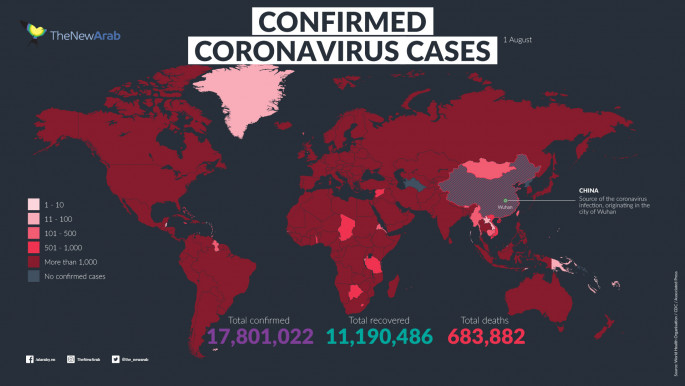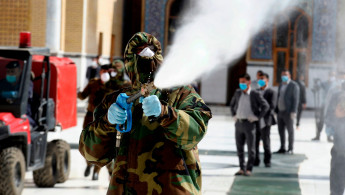Iraq quarantines holy city of Najaf over coronavirus fears
Iraq's Najaf province - home to holy Muslim Shia shrines - will be closed for a week to all non-residents starting on Wednesday, state news agency reported on Monday.
Najaf is a major destination for pilgrims visiting the shrine of Ali ibn Abi Talib, the cousin and son-in-law of the Prophet Muhammad.
Millions of travellers from around the world visit the site every year, especially during the period to mark the birth of Ali, which was this year celebrated on 7 and 8 March.
Iraq has recorded at least 71 cases of the deadly COVID-19 infection, including seven total deaths from the virus.
Iraq on Friday evening announced further measures to contain the novel coronavirus, after representatives of the country's top Shia cleric took the rare step of not delivering his weekly sermon to worshippers.
Read also: Netanyahu plans to deploy army of children to disinfect Israel from coronavirus
The Iraqi government's crisis unit said shopping centres will only open three hours a day, schools and universities will be closed until 21 March, and public administrations will only open for a few hours a day, effective immediately.
Foreign nationals arriving from France and Spain will be denied entry.
Authorities had already closed the borders with neighbouring Iran, which has seen the world's second-deadliest outbreak, and banned the entry of foreign nationals travelling from there and other badly affected countries.
Schools, universities, cinemas and other public spaces had been closed for the past week, but restaurants, malls and cafes have remained open.
Twitter Post
|
On Friday, representatives who usually read Grand Ayatollah Ali Sistani's address at a packed mosque, broadcast live on state television, did not appear.
Religious authorities had already closed the shrine of Imam Hussein, grandson of the Prophet Muhammad, where his sermon is usually delivered, to mitigate the risk of contagion.
The 89-year-old Sistani is based in the Shia holy city of Najaf, south of Karbala, and never appears in public.
Read more: How Gulf countries succeeded where Iran failed on containing coronavirus
An official at the site in the holy city of Karbala told AFP that "the cancellation of Friday prayers at the Imam Hussein shrine is a first since 2003", the year an American-led invasion toppled veteran dictator Saddam Hussein.
Sources close to Sistani's office confirmed the unprecedented nature of the decision.
Authorities are particularly worried about coronavirus spreading via Shia holy sites, which attract millions of pilgrims including many from Iran.
Provincial authorities have barred non-residents from entering Karbala province from Friday.
Sistani had dedicated part of his last two sermons to the health situation in the country of 40 million.
The virus has fuelled panic among Iraqis who say the war-ravaged country's health system cannot handle the epidemic.
On Sunday, prominent Shia scholar Ayatollah Sayed Hadi Al-Modaressi, a native of Iraq's holy Karbala city, was diagnosed with the coronavirus and was reported to be receiving treatment under quarantine, his office and family members said.
The COVID-19 was first detected in China in early December but has since spread across much of the world. Worldwide, more than 100,000 case have been confirmed and the death toll stands at 3,800.
Follow us on Facebook, Twitter and Instagram to stay connected





 Follow the Middle East's top stories in English at The New Arab on Google News
Follow the Middle East's top stories in English at The New Arab on Google News
![Netanyahu furiously denounced the ICC [Getty]](/sites/default/files/styles/image_330x185/public/2024-11/GettyImages-2169352575.jpg?h=199d8c1f&itok=-vRiruf5)
![Both Hamas and the Palestinian Authority welcomed the ICC arrest warrants [Getty]](/sites/default/files/styles/image_330x185/public/2024-11/GettyImages-2178351173.jpg?h=199d8c1f&itok=TV858iVg)
